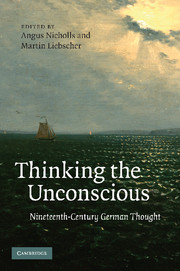Book contents
- Frontmatter
- Contents
- Notes on contributors
- Introduction: thinking the unconscious
- 1 The unconscious from the Storm and Stress to Weimar classicism: the dialectic of time and pleasure
- 2 The philosophical significance of Schelling's conception of the unconscious
- 3 The scientific unconscious: Goethe's post-Kantian epistemology
- 4 The hidden agent of the self: towards an aesthetic theory of the non-conscious in German romanticism
- 5 The real essence of human beings: Schopenhauer and the unconscious will
- 6 Carl Gustav Carus and the science of the unconscious
- 7 Eduard von Hartmann's Philosophy of the Unconscious
- 8 Gustav Theodor Fechner and the unconscious
- 9 Friedrich Nietzsche's perspectives on the unconscious
- 10 Freud and nineteenth-century philosophical sources on the unconscious
- Epilogue: the “optional” unconscious
- Works cited
- Index
- References
Introduction: thinking the unconscious
Published online by Cambridge University Press: 04 August 2010
- Frontmatter
- Contents
- Notes on contributors
- Introduction: thinking the unconscious
- 1 The unconscious from the Storm and Stress to Weimar classicism: the dialectic of time and pleasure
- 2 The philosophical significance of Schelling's conception of the unconscious
- 3 The scientific unconscious: Goethe's post-Kantian epistemology
- 4 The hidden agent of the self: towards an aesthetic theory of the non-conscious in German romanticism
- 5 The real essence of human beings: Schopenhauer and the unconscious will
- 6 Carl Gustav Carus and the science of the unconscious
- 7 Eduard von Hartmann's Philosophy of the Unconscious
- 8 Gustav Theodor Fechner and the unconscious
- 9 Friedrich Nietzsche's perspectives on the unconscious
- 10 Freud and nineteenth-century philosophical sources on the unconscious
- Epilogue: the “optional” unconscious
- Works cited
- Index
- References
Summary
In the entire world one does not speak of the unconscious since, according to its essence, it is unknown; only in Berlin does one speak of and know something about it, and explain to us what actually sets it apart.
So wrote Friedrich Nietzsche in 1873, as part of his ironic response to the success of the Philosophy of the Unconscious (Philosophie des Unbewussten, 1869), written by the Berlin philosopher Eduard von Hartmann. If the influence of a concept can be gauged by the way in which it is received by the public at large, if not in academic circles, then Hartmann's volume, which ran to some eleven editions during his lifetime alone and was seen by some as introducing an entirely new Weltanschauung, might be regarded as marking one of the pinnacles of the career of das Unbewusste (the unconscious) during the nineteenth century. Although Hartmann's understanding of the unconscious was, like Freud's, subjected to a scathing critique at the hands of academic philosophy and psychology, it nevertheless took some half a century or so for Freud to supersede Hartmann's public role as the chief theorist and interpreter of the unconscious for the German-speaking public. Today the concept of the unconscious is arguably still first and foremost associated with Freud and with his successors such as Carl Gustav Jung and Jacques Lacan; in short: with psychoanalysis in general.
Information
- Type
- Chapter
- Information
- Thinking the UnconsciousNineteenth-Century German Thought, pp. 1 - 25Publisher: Cambridge University PressPrint publication year: 2010
References
Accessibility standard: Unknown
Why this information is here
This section outlines the accessibility features of this content - including support for screen readers, full keyboard navigation and high-contrast display options. This may not be relevant for you.Accessibility Information
- 2
- Cited by
